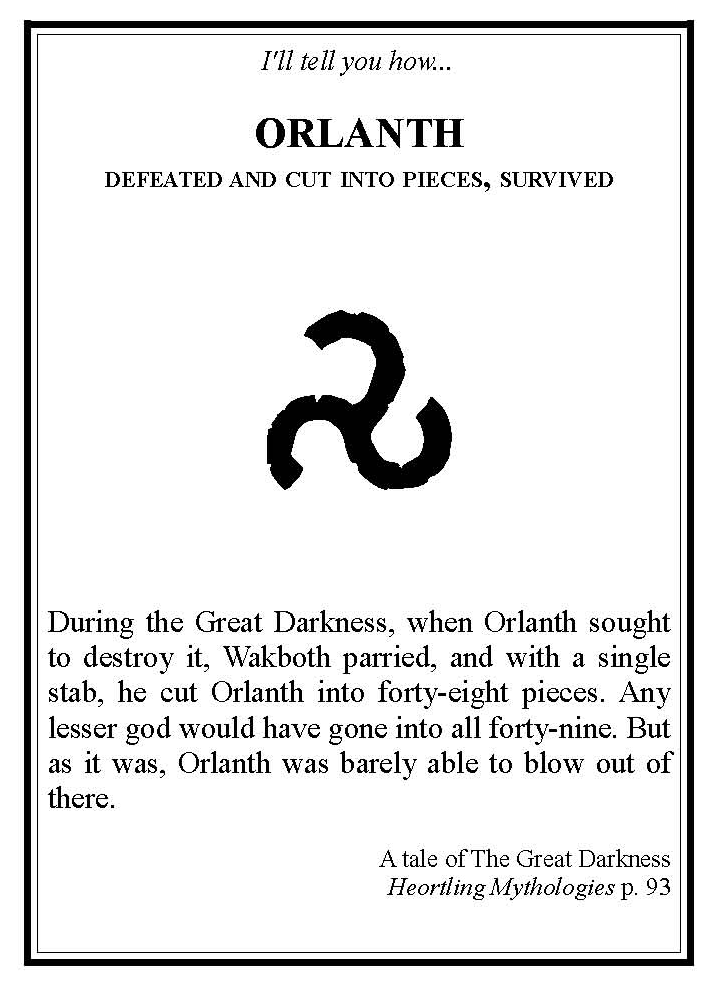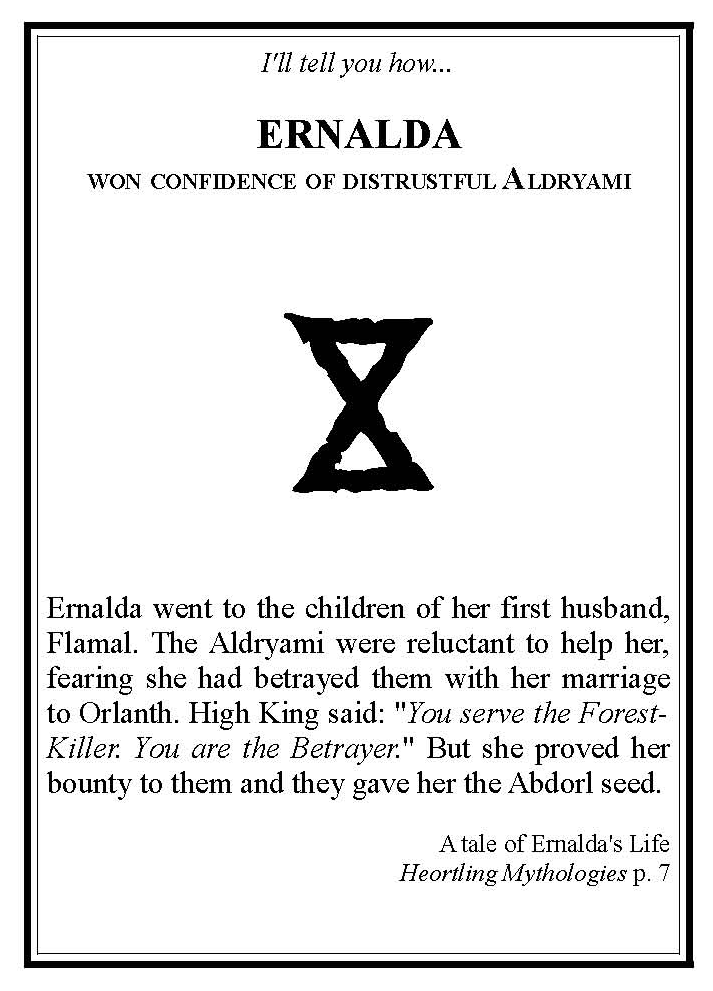
or “How can I encourage players to portray mythical behavior?”
Grégory Molle
I found some of the best tools for that in Sartar: Kingdom of Heroes: its flexible rules about rune affinities, and its clan generation questionnaire. This article is about another and complementary tool inspired by Dying Earth RPG, designed by Robin Laws, John Snead and Peter Freeman (Pelgrane Press). In this game, at the beginning of the session, the narrator gives his players a quotation taken from one of the many tales of Cugel. When a player makes a fun and pertinent use of his quotation, he gets a reward because that helps to reproduce in game the atmosphere of Jack Vance's stories. This is a system we can try with Glorantha.
What are we looking for when we're playing HQ or RQ? We want our characters to behave like the gods they worship. That's the way to reproduce in game the kind of feeling we have when we read myths. The examples of cards that you will find in this article are like the quotations in Dying Earth: at the beginning of the game, the narrator gives one of them to each of his players, according to the god each character worships. If the player makes a good use of it during the game, he gets a reward – hero points, if you play HQ, or Mongoose's RuneQuest. These cards help Gloranthan newbies to improve their “Gloranthan praxis”. What is a “good use” of the card? I see two main uses. Firstly, when the character has to make a choice and/or to react to something in the story, what determines the good choice, the good reaction? The imagination of the player, of course, is the first answer... but the cards can help. And they do it with a brief but pure Gloranthan stuff. Secondly, when the character wants to use a magical ability (or a rune affinity). In Glorantha, that means he's reproducing one of his god's deeds. Here again, cards are not necessary... but they help. Let's go a bit further and have a detailed look at these cards.
 1) “I'll tell you how...” These words help the player to remember that when he's using the card during the game he becomes a storyteller for some seconds. It's not just “Well, guys, here is a card that gives me an advantage, right?” The least he can do is to read the title and the quotation (see point 5). Of course, if he wants to add some details, he's welcome.
1) “I'll tell you how...” These words help the player to remember that when he's using the card during the game he becomes a storyteller for some seconds. It's not just “Well, guys, here is a card that gives me an advantage, right?” The least he can do is to read the title and the quotation (see point 5). Of course, if he wants to add some details, he's welcome.
2) The name of the god. As a narrator, you’ll have to create cards according to the gods worshipped by the characters of your players.
3) A brief summary of what the god did. It gives the player the fundamental information on what the card is about. For example, “Orlanth, cut into pieces, survived” indicates clearly that the card is about “survival in extremely bad conditions”. A pertinent use of the card must have something to do with that — literally, or possibly in a more metaphorical way.
4) The rune. When the narrator creates a card, he has to determine the rune associated with the god's deed quoted on the card. If the player wants to use the card and the quotation to justify a magical action of his character, this is the rune he has to use according to the rules (as an affinity or augmentation) to be rewarded at the end of the session. Of course, it may happen that the quotation of the myth has, in the mind of the player, a link with another rune of the god. The narrator should listen to his explanations and, if he's convinced, allow the player to use the card in this personal way.
 5) A quotation from the myth. The player has to read this quotation. That's an opportunity for him and other players to hear about some Gloranthan stuff. Two possibilities:
5) A quotation from the myth. The player has to read this quotation. That's an opportunity for him and other players to hear about some Gloranthan stuff. Two possibilities:
a) The quotation is enough for the players, they don't need more. The player using the card has just has to determine the link between the quotation and the story he's playing.
b) Players want to hear more about this myth. Ok, let's go and tell the story. How? Maybe the narrator, who made the card and knows the story perfectly, is able to complete the story. He tells, the players listen. An IV of pure Gloranthan Myth. Or, maybe, the players have personal ideas, maybe they feel like improvising the complete story. Even better! They do it, the narrator guides them if necessary. The quotation is completed, the link with the adventure established. Players improvised something that is not The True Story written in a Gloranthan scholarly book? Who knows? There are so many versions, variations, greggings...
What about rewards? Here are some propositions. A pertinent but literal use of the card – the title, the quotation, the rune, no more no less – should be rewarded with 1 HP at the end of the game. A pertinent and original use of the card – details added, personal interpretation of the quotation, or anything else compatible with MGF – should be rewarded with 2 HP. Finally, both narrator and players should vote at the end of the game on the best use of the cards (narrator's vote counts double if necessary): the player should win 1 additional HP, maybe more... What happens when a player doesn't use any card during the game? Well, being not rewarded is in itself a punishment, and it's probably enough. Of course, we can't completely ignore the possibility that a player could have a more or less irrelevant use of the card. But it can't be the end of the story: in this case, the narrator has to help the player to find a better way.
More Cards(91Kb PDF File)





